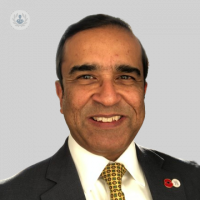Ménière's disease and how to manage it
Written in association with:Ménière's disease is a chronic condition of the inner ear that affects balance and hearing. It can be quite debilitating, causing vertigo, tinnitus, and hearing loss. Understanding the symptoms and management strategies is crucial for those affected by this condition. Esteemed consultant ENT surgeon Professor Jaydip Ray provides an overview of Ménière's disease and offers guidance on how to manage it effectively.

What are the symptoms of Ménière's disease?
Ménière's disease manifests through several distressing symptoms, which can vary in severity and frequency:
- Vertigo: Sudden and severe episodes of dizziness that can last from a few minutes to several hours.
- Hearing loss: Fluctuating hearing loss, particularly in the affected ear. Over time, hearing loss may become permanent.
- Tinnitus: Ringing, buzzing, or roaring sounds in the affected ear.
- Aural fullness: The affected ear has a sensation of pressure or ‘fullness’.
What causes Ménière's disease?
The exact cause of Ménière's disease is not known, but several factors may contribute to its development, including abnormal fluid buildup in the inner ear (endolymphatic hydrops), genetic predisposition, autoimmune responses, and viral infections.
How is Ménière's disease diagnosed?
Diagnosing Ménière's disease involves a combination of medical history evaluation, physical examinations, and specific diagnostic tests. A detailed medical history helps the doctor understand the frequency, duration, and severity of symptoms such as vertigo, hearing loss, tinnitus and a feeling like the ear is full of something. The physical examination may include checking for balance and hearing capabilities.
Audiometric tests are conducted to assess hearing function and to detect any hearing loss patterns typical of Ménière's disease. The doctor may also perform a balance assessment, which includes tests like the electronystagmography (ENG) or videonystagmography (VNG) to evaluate the inner ear and eye movements.
Additionally, imaging tests such as MRI or CT scans might be used to rule out other conditions that could cause similar symptoms. Blood tests could also be conducted to exclude infections or other medical issues. Diagnosing Ménière's disease often requires ruling out other potential causes of the symptoms to arrive at a conclusive diagnosis.
How is Ménière's disease managed?
While there is no cure for Ménière's disease, various management strategies can help control symptoms and improve quality of life. These include:
Medications
Doctors may prescribe medications to help manage the symptoms of Ménière's disease. These can include diuretics to reduce fluid buildup, antihistamines and antiemetics to control vertigo and nausea, corticosteroids to reduce inflammation and benzodiazepines to relieve vertigo and anxiety.
Dietary changes and lifestyle modifications
Adjustments in diet and lifestyle can have a significant impact on the management of Ménière's disease. Recommended changes include:
- Low-sodium diet: Reducing salt intake can help decrease fluid retention.
- Caffeine and alcohol: Limiting these can help reduce symptoms.
- Hydration: Drinking adequate fluids while avoiding excessive intake.
- Stress management: Techniques such as meditation, yoga, and counselling can help reduce stress, which can exacerbate symptoms.
- Avoiding triggers: Identifying and avoiding specific triggers, such as certain foods or activities, can help manage symptoms.
How is Ménière's disease treated?
Other treatments may be necessary for more severe cases. Vestibular rehabilitation therapy involves exercises to improve balance and reduce dizziness. Hearing aids can help with hearing loss, and tinnitus retraining therapy can manage tinnitus.
In severe cases where other treatments are ineffective, surgical options may be considered, such as endolymphatic sac decompression to relieve fluid pressure, vestibular nerve section to control vertigo, or labyrinthectomy to remove the balance function of the inner ear.
If you’re looking for expert advice regarding management of Ménière's disease, arrange a consultation with Mr Ray via his Top Doctors profile.


